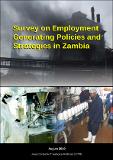Survey on Employment Generating Policies in Zambia
Date
2011-08Author
Jesuit Centre for Theological Reflection
Type
SurveyLanguage
enItem Usage Stats
60
views
views
123
downloads
downloads
Abstract
The basic fact that low income households possess few assets of their own can hardly be contested. The most abundant resource at the disposal of the poor is their labour. Thus, a development strategy that more fully employs a country’s human resources and raises the returns to labour becomes a powerful tool for raising household incomes and reducing poverty (World Bank, 2001). In other words, when employment expands along with production, the benefits of economic growth will be widely shared. However, despite the numerous attempts by the Government to promote formal employment in Zambia, it is very clear that change is happening at a snail’s pace. Besides, there has been growing concern among the citizenry regarding the quality of employment that has resulted from recent efforts at employment generation, particularly in the context of foreign private investment driven job creation thrusts. It is, therefore, important for policy makers, business houses and civil society organizations to begin to act on present possibilities to ensure that formal employment, both in terms of quantity and quality is prioritized in Zambia.
Description
The basic fact that low income households possess few assets of their own can hardly be contested. The most abundant resource at the disposal of the poor is their labour. Thus, a development strategy that more fully employs a country’s human resources and raises the returns to labour becomes a powerful tool for raising household incomes and reducing poverty (World Bank, 2001). In other words, when employment expands along with production, the benefits of economic growth will be widely shared. However, despite the numerous attempts by the Government to promote formal employment in Zambia, it is very clear that change is happening at a snail’s pace. Besides, there has been growing concern among the citizenry regarding the quality of employment that has resulted from recent efforts at employment generation, particularly in the context of foreign private investment driven job creation thrusts. It is, therefore, important for policy makers, business houses and civil society organizations to begin to act on present possibilities to ensure that formal employment, both in terms of quantity and quality is prioritized in Zambia.
This report draws on a study undertaken by the Jesuit Centre for Theological Reflection (JCTR) that sought to understand the policies, strategies and practices currently being undertaken by the Government of the Republic of Zambia in generating formal employment. Admittedly, a question would arise as to why the focus of this study was on formal employment when the nature of employment in Zambia includes informal employment. This was deliberate precisely because Zambia’s formal employment is closely associated with work that generally meets decent work standards i.e. work that guarantees adequate income, social protection, the respect of fundamental rights and principles at work as well as social dialogue (ILO, 2008:7). Besides, it is the case that Zambia provides substantial investment incentives whose benefits in relation to formal employment creation remain unclear. Thus, understanding why formal employment is moving at a snail’s pace despite substantial investment incentives provided by Government required a more focused investigation.
